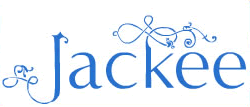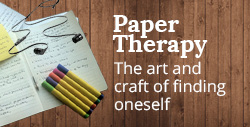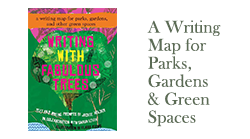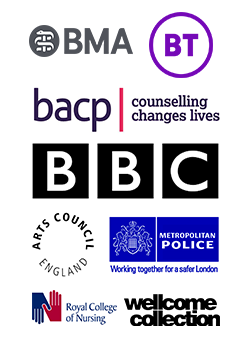Writing
Saturday, July 4th, 2015

Earlier this week I attended a premier showing of the new Amy Winehouse film. I had no idea of what to expect and found the film tragic and yet a moving portrayal of Amy’s short life and the bitter sweet fame and success she did not live to enjoy. What we saw on camera was Amy in both her beauty and the ravages of inner turmoil.
The film leaves you with no doubt of Amy’s talent and gift as a singer and songwriter. But the roots of her unresolved childhood wounds leave her damaged and troubled. The issues around her mental health are eluded to have taken root in childhood with the viewer learning that she was on anti-depressants from a young age.
There is no doubt that emotionally and psychologically Amy did not get the right kind of emotional and psychological support she desperately needed as her career and fame kicked in. In Amy’s case what appears to be the root cause of the pain she carries seems to have been triggered by her father’s departure from the family as a result of an affair. She becomes a rebellious, strong willed young woman who gives her mother a hard time and goes onto to have Daddy issues throughout the rest of her life.
Amy makes poor choices with the men she has relationships with echoing signs of low self-esteem, co-dependency, unresolved issues with her father and her own deep trauma. Amy is very much the tortured but gifted artist. It is hard not to love and like this fragile, vulnerable and troubled young woman. It’s all there. The emotional fractures she carries are filled with increasing amounts of drugs and alcohol.
What becomes evident throughout the film is that Amy is not dealing with her pain she is holding it off. Watching the film I remembered something I had read where the US writer Anne Lamott http://www.salon.com/writer/anne_lamott/ gives advice to a writer who was physically abused by his mother as a child. The man is still carrying the wounds of having his hands burnt on the stove as a child by his mother. He asks Lamott how can he forgive his mother who is now a frail old woman. Lammott replies, ‘Use it she tells him.’ ‘She’s old though,’ he says, ‘Her life has not been a happy one.’
Lamott advises him to write about the experience but to change the family, change where they lived, change everything except the truth of the experience that when the little boy was naughty the mother held his hand to the flame. I can’t help but think if only Amy had been able to channel her pain differently?
It’s hard to believe that her father Mitch convinced his daughter in the early days not to go into rehab. She sings about this decision here https://www.youtube.com/watch?v=KUmZp8pR1uc Perhaps had she gone there in the early days of her growing fame we may have witnessed a different ending. I left watching the documentary feeling ambivalence about her father’s intention and how blind we can be to both our own pain and the pain of our loved ones.
I came away with deep respect and reverence for Winehouse’s song lyrics. This to me was the one place Amy attempted to begin the healing process. When signing her first record deal she tells her manager that she doesn’t write songs, she writes poems. It’s obvious that her song lyrics are deeply personal narratives charting her life experiences, the losses and the betrayals and I can’t help think if only someone had said to Amy, “Here, go on, use this journal to write it all out, the wounds, the warts and the wonders belong to the page.” Based on research that shows how keeping a journal can reduce stress, strengthen your immune system and improve moods and physical health and well-being.
Of course there might be complications for someone as famous as Winehouse keeping those words private and safe from those who surrounded her. Some of those around her may well have seized the opportunity to sell her journals to the press? And her depression may well have been too deep for words to penetrate and make a lasting impression. Who knows but nonetheless less I can’t help feel that keeping a journal would have been a good thing in the trajectory of a young life going rapidly downhill.
Young girls model themselves on artists like Winehouse and perhaps there’s still hope as recent USA market research found that 83 per cent of young women still keep a diary compared with 69 per cent in the 1990’s. The issue of mental health is a growing concern globally and here in the UK the cost of the UK society of mental health problems has been estimated at 98 million a year, greater than that of crime writes Ed Halliwell in the Be Mindful Report commissioned by the Mental Health Foundation.
I like many others ask the question whether taking drugs and alcohol halted Amy’s chances of healing? I think I know the answer. I like what Jane Fonda had to say in her Ted Talk, Life’s Third Act https://www.ted.com/talks/jane_fonda_life_s_third_act
“It’s not having experiences that make us wise, it’s reflecting on the experiences that we’ve had that make us wise. That helps us become whole, brings wisdom and authenticity. It helps us become what we might have been.”
Reading those lines and thinking about the film made me realise Amy really could have done with an older, wiser mentor who had the foresight to see into the bleakness of what she was really going through. Had she gone into rehab and committed to the difficult inner work of healing her demons she would have had a sponsor and counsellors who would have been on her side. There was a huge sense that this was a young girl left to cope emotionally on her own.
But when it comes to what would have helped Amy the answers are more complex and debatable. Perhaps the words of Graham Greene offer further food for thought who said, “Writing is a form of therapy. Sometimes I wonder how all those who do not write, compose or paint can manage to escape the madness, the melancholia, the panic and fear which is inherent in human condition.”
After all Amy Winehouse is not the first famous artist to suffer at the ravages of mental health, alcohol and drugs, think Jimmy Hendrix and Janis Joplin who were both the same age as Winehouse when they died. Her death was a tragedy and perhaps despite the complexity of mental health her life could have been saved for many more years to come.
The tag line for my work around journaling and therapeutic writing goes like this, Writing Changes Lives and Lives Are Changed By Writing. I know from personal experience that journaling has helped saved me big time from giving into the clutches of depression on a deeper scale. Whilst it has not saved me outright it has been a personal therapeutic activity I can use on a regular basis to self regulate my emotions and feelings.
If you have things on your mind or are finding life difficult to cope with reach out to many of the mental health organisations that exist in every area, speak to your doctor or a trusted family member or friend. And if your mental health issue is not too debilitating try keeping a journal.
You can download my free Journal Journey guidebook when you sign up on our free resources page on the website http://www.jackeeholder.com/sign-up/ It includes over seventy journal prompts and suggestions for what to write about in your journal. If you know someone experiencing mental health issues please feel free to share the free guide with them.
I’ll leave you with these final words from author and writer Laraine Herring from her book, Writing Begins With The Breath, “The writing outlasts jobs, partners and pets. The writing itself is the continuum of our lives.” http://laraineherring.com/writing-begins-with-the-breath/
Click here to watch Amy singing the haunting song, Love is a losing game https://www.youtube.com/watch?v=nMO5Ko_77Hk
No Comments
Tuesday, June 23rd, 2015

On my way into work this morning I wandered around the largely deserted cobbled streets around Borough Market at London Bridge.
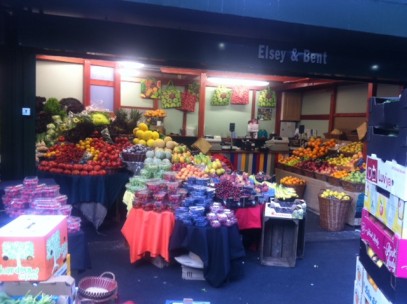
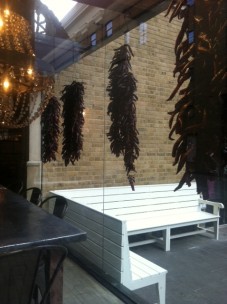
I enjoyed pausing and clicking away on my iphone capturing colours and images offset through the huge net of my sensory imagination.
I see these early morning wanderings often placed at the start of a crowded day as my own kind of creative meditation. After all there are as many different ways to meditate as there are to tell a story.
Building creative encounters into my day has a number of benefits, all productive and useful.
- It clears my head.
- It’s calming and relaxing.
- Without even realizing it my stress lowers as does anxiety and worry.
- For around forty minutes I got lost in London city delighting in its architecture and all that it offered and gave myself breathing space.
Slowing down impacts on the quality of your thinking. These last few months have been very stressful, more than I care to admit. Taking time out in my day allows me to really see and take in my surroundings. It stimulates and ignites other creative portals. And again almost as a by-product this clear sight translates into other areas of life and work and allows you to see more clearly in those areas too.
This was the first image that captured my attention as I entered the market hall a blackboard posing this question … Before I die I want to …
This is a question well worth taking to your journal. I’d love to know what your answer to the question would be?
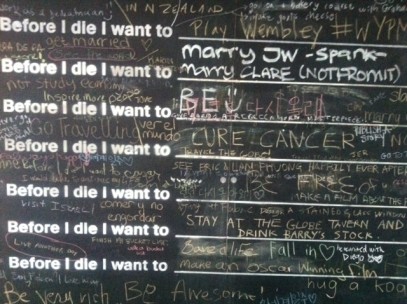
What follows is a series of organically snapped images taken as I wandered looking for an early morning quiet spot to write in.
I didn’t find a quiet spot, that seems to be like gold dust here in the city but I did manage to get a bit of quiet headspace before the morning commuters clogged the air space.
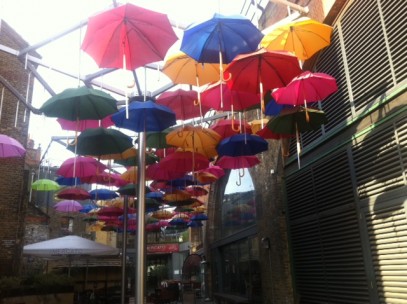
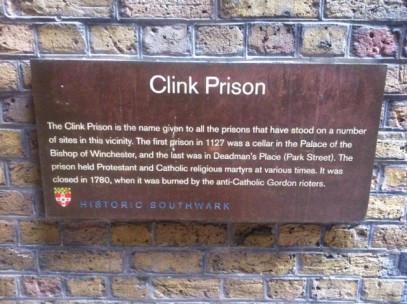
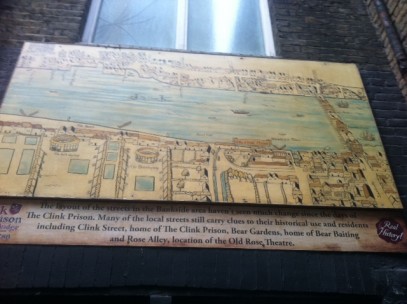
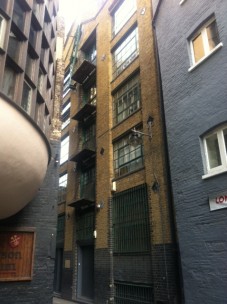
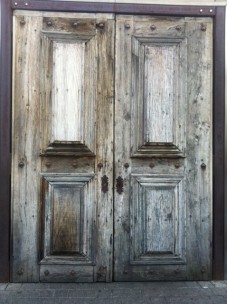
Feeding myself creatively in this way sets up my day in the best possible way. Things get done because of giving myself this time in this way.
If you would like to experience a spot of what it feels like to be a Slow Creative in the city come and join me and photographer Sarah Hickson http://www.nowliveevents.org/sarah-hickson/ at the Slow Creative workshop part of the Switch On Now Festival at Deptford Lounge a @nowliveevents on Wednesday 8th July 4pm-6pm.
To find out more about the Slow Creative workshop and to book click here (£6 full price/£4 Concessions/Deptford Residents £3): http://www.nowliveevents.org/deptford-lounge-2015/
Tweet #Creativity #SwitchonNOW @Deptford Lounge @nowliveevents
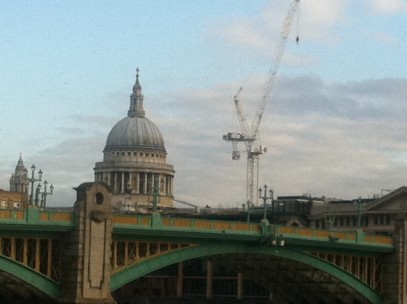
No Comments
Sunday, June 14th, 2015
In today’s blog post I’m delighted to share Nicole Moore’s favourite tree a Banyan tree which she posted on my twitter feed using the hastag #treesonyourtravels
Nicole Moore’s love of trees started in childhood, in Highbury, North London, which has a lot of lovely tree-lined roads. Her favourite school art lessons were when she was given the freedom to paint whatever she liked. It was always a tree.
Nicole found painting trees soothing. This photo of Nicole sitting on a Banyan tree was taken in August 1988 in the most exciting, enchanting and beautiful Oratava Acclimatisation Gardens, on the edge of Puerto de la Cruz in the second most major town in Tenerife.
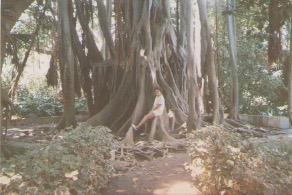
Nicole penned a pantoum poem about her favourite tree.
So what’s a pantoum poem I hear you ask?
Well according to Nicole the pantoum is a poem of any length composed of four-line stanzas. In each stanza, the second and fourth lines serve as the first and third lines of the next stanza.
The last line of a pantoum is generally the same as the first line. Nicole really likes this form of poetry because it removes certain elements of choice for you as a poet, and that can be kind of freeing.
Still a Tree
It’s hard to believe
The Banyan tree
Started its life as an epiphyte
Yet still, beauty lies deep
The Banyan tree remains
Strong, eloquent, solid, still tree
Yet still, its beauty lies deep
Gracious and grounded
Strong eloquent, solid, still a tree
Over 200 years old
Gracious, grounded
Its majestic presence is irresistible
Voiceless it speaks
Started its life as an epiphyte
Connecting roots directly and indirectly to its central trunk
It’s hard to believe
© Nicole Moore May 2015
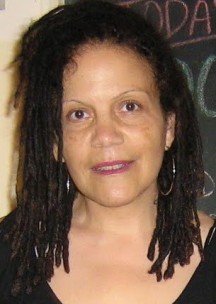
Nicole Moore is a freelance writer and editor with experience in magazines, newspapers, blogs and poetry anthologies. She writes non-fiction in the form of personal essays, memoir and poetry.
Nicole is the author of Brown Eyes, Sexual Attraction Revealed and Hair Power Skin Revolution.
If you would like to tell us about a favourite tree or a tree from childhood please feel free to send it into:info@jackeeholder.com or share it on my twitter feed @jackeeholder using the hastag #treesonyourtravels
Another beautiful Banyan tree for you to meditate on.
©Isac Goulbert

No Comments
Sunday, June 14th, 2015
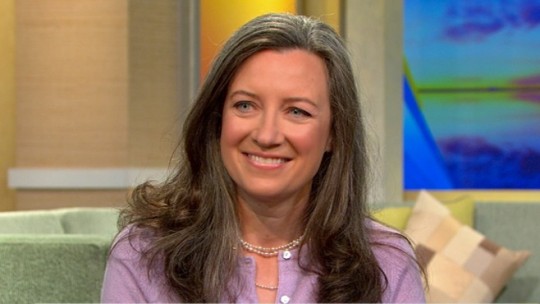
I’ve just listened to this podcast interview with Dominique Browning former editor-in-chief of House & Garden magazine on the Debbie Millman, Design Matters podcast series and her words really resonated with me.
The entire interview reinforced why the message in my work as a coach and trainer working with leaders and coaches I go on and on about finding quiet pockets in our day to get still so you can connect in with you. I know this sometimes comes across as soft and fluffy but really it isn’t. Slowing down and becoming more mindful really is a serious antidote to depression, to stress, to combating mental health issues and burnout to finding a way of working and living that is based on wholeheartedness, that is meaningful and a gateway to productivity.
It’s why I continue to communicate this message over and over again with coaches and leaders I work with even when I get the look like ‘really’, or ‘this is so boring, tell me stuff I can do that is quick and will fix my problems now.’ It still surprises me just how many coaches, leaders, executives and professionals across a range of industries who work with people find it difficult to look within and resist working consciously and pro-actively on their own inner lives.
Finding those small pockets in my day whether I am writing in my journal, going for a walk or sitting quietly in my car for a few minutes before my next appointment helps me tremendously. This approach personally marks the difference between surviving and thriving. It can be so easy to thread water through our day multi tasking and going at a break neck speed. In my world stopping in this way is a form of healthy insulation, a welcome breathing space allowing me to absorb and respond without being knocked for six when the inevitable challenges, dramas and dilemma’s present themselves.
Here’s what Dominique had to say in the interview with Debbie Millman,
“You can get an enormous amount of nurturing out of connecting with the world around you in small moments throughout everyday and I began I realize that even as my life was beginning to speed up again I needed to carve out a few minutes of just meditative times for myself. When I would just connect with something beautiful, interesting, troubling, whatever it was but something everyday that made me stop and think and be very, very still.”
Listen to the full interview here: https://soundcloud.com/designmatters/design-matters-with-debbie-105
Dominique Browning former editor in-chief of House & Garden in an interview with Debbie Millman from Design Matters discussing slowing down and her life after House and Garden magazine closed down and she lost her job as editor-in-chief.
Dominique Browning is the author of Slow Love: How I Lost My Job, Put On My Pajamas & Found Happiness and blogs at: http://www.slowlovelife.com/
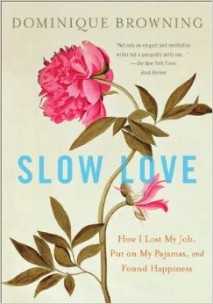
No Comments
Tuesday, June 9th, 2015
I’m sharing a selection of a few of the photo’s captured on my iphone during our Greece Inside Writer’s retreat last week.
Images tell their own stories.
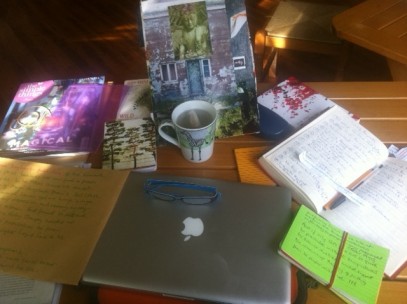
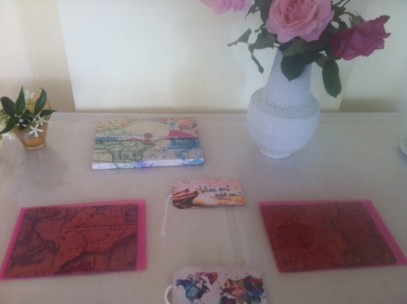
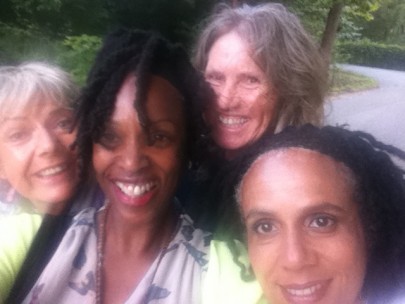
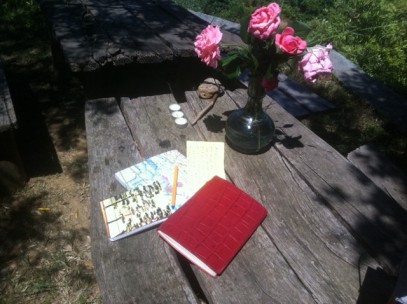
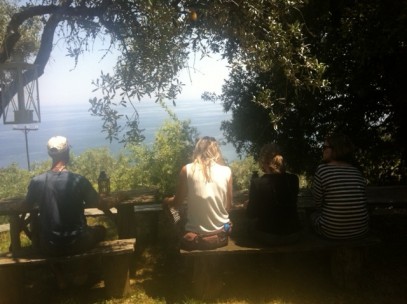
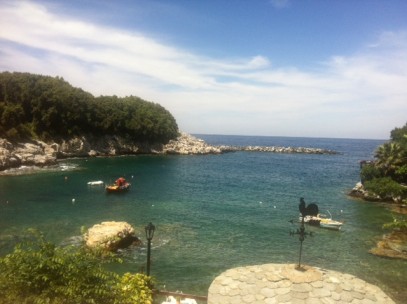
Already I’m missing the long days and light, the sunshine (even though it was cold the first two nights and we had to light a fire), the amazing view of the Aegan Sea, the lovely company of the writers on retreat, the retreat staff and the energy to write, write write.
The photo’s are a combination of our environment, images of the creative writing activities the group engaged in.
Our time away on retreat was rich and a lovely mixture of long stretches of writing, conversations in the group about the writing process and craft of writing, walks down Mount Pelion to the sea and beach, the full moon and the most gorgeous food made mostly with fresh, local produce.
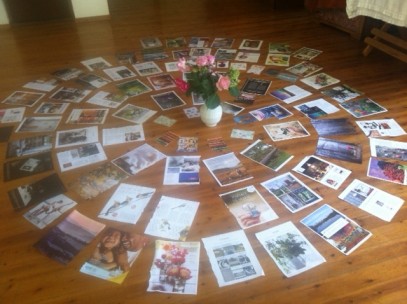
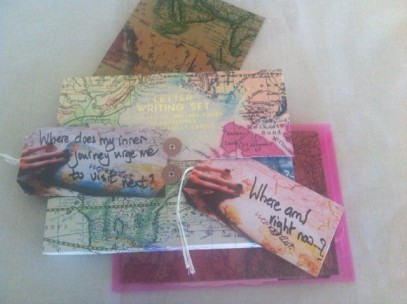
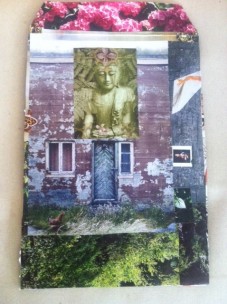
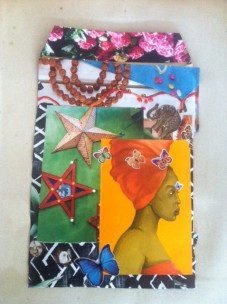
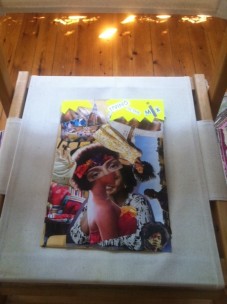
I’m already thinking about when my next retreat will be. Time away from my everyday worked wonders for my productivity. I drafted several blog posts by hand in a continuous, highly charged flow. Let’s say looking in from the outside I probably had the look of someone working fast and furious.
We’re already booked to return in 2016, first week in June, so do email us if you are interested in joining us next year.
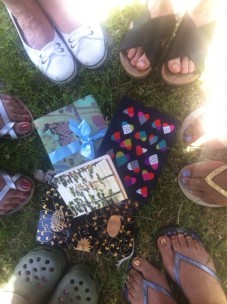
No Comments
Thursday, June 4th, 2015
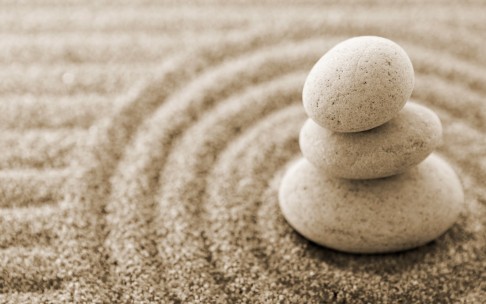
Halfway into our retreat we entered into a twenty-four period of silence. It’s my most treasured and revered part of our time here in Greece.
That’s not to say that there isn’t resistance. Whether it’s voiced out loud or not, it’s there. It shows up in a range of ways. Like having anxious feelings about having to spend 24 hours in silence. Needing clarity about what was allowed and what wasn’t allowed during the silence. Questioning whether the time would be fruitful or not?
The one thing I know from past experience is that the silence will weave her magic over each of us in her own special way once the silence begins. I arrived at the start of the silence with a long list of writing projects, many needing completion. I knew this was a valuable time and space to make traction in my work.
I knew the silence would clear a space for me. With the distraction of speaking removed the long stretch of time would give me that much needed space to work without interruption. In normal everyday life our inner voice is distant and then by the time we find and make space to sit down and write we have to spend more time coaxing that voice from deep recesses inside ourselves. That’s why retreats offer the space to not just find our voice but also use our voice. In the silence we get to listen, we get to hear what it is we want to say, what it is we want to write.
I like what UK coach, Ken Barnes has to say about the word silent, ‘When you move the words silent around you get the word listen.’
Right now I’m writing this blog post sitting in a shaded olive groove in the middle of Mount Pelion, which in Greek mythology is the birthplace of the greek god Chiron, half man, half beast.
In the background I can distinguish the different sounds of calls of birds native to Greece. If I fine tune my hearing even more I can dip beneath the sounds on the surface and hear the honey coated humming of the honey bees who live in their thousands in hives on the mountain side not far from where I’m seated.
Silence can be gold to a writer. Whilst we don’t need it all of the time we need it a lot of the time. We need the silence to create. Right now the silence finds me in a creative flow, unleashed by the opportunity to indulge in the rarity of silence. Tonight I plan to write some more under the gaze of the full moon, late into the night after supper. There is so much to appreciate about the silence for example noticing how the flavours of food become more accentuated when we eat in silence.
There’s a lot to learn from the silence – the staff at the retreat centre are also observing the silence but for some it is hard and frequently they resort back to speaking using the volume of their everyday voices.
The parallel process between the staff breaking the silence is also a challenge for us as writers. Many writers despite wanting to write find themselves avoiding silence, afraid of what the silence might tell or show you. I found the silence breath takingly productive. On my last count I had drafted four new pieces of work, uploaded a new blog post, written a poem that emerged as I sat on the bedroom balcony with the full moon gazing down on me. The stretch of silence was like running a marathon. I had a distance to go but no idea of what the journey would be like.
As I expected a couple of hours away from breaking the silence and already I wish we could be in the silence for another two, three days. I’m already thinking how I could have more of this in my life back home. London is a busy city. I live next door to two sets of neighbours who are very noisy. My partner does not require the levels of silence and quiet I’m in constant need of.
But paradoxically there maybe some mileage that silence is becoming harder and harder to access whatever part of the world you’re in. It’s a challenge because even in this lovely, quiet spot in Greece we could not control the continuous sound of a barking dog echoing across the hillside for most of the day and night.
We cannot always control the level of silence we experience in the outside world. But when we hunker down and give the page or our computer screen our full attention we’re less likely to require absolute silence.
A question I’d like to leave you with is:
What can you hear in the silence and what can the silence bring to your writing?
No Comments
Tuesday, June 2nd, 2015

I cannot explain the deliciousness of the gorgeous, healthy food we’re being fed here at Kalikalos here in Greece. We’ve been fortunate to have the well-loved chef, James from Findhorn cooking the most divine food for us. We’re all complaining of putting on too much weight and returning home heavier than when we arrived. Hopefully emptying some of our stories onto the page will help with that. However that doesn’t seem to be stopping us, myself included going up for seconds, even thirds. His cooking is so good.
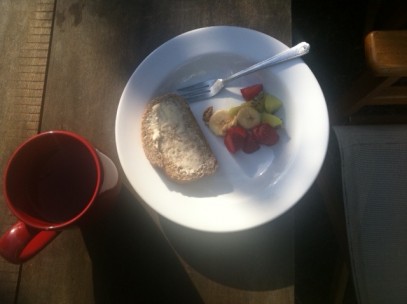
Staying on the subject of food the business of writing is hard work, both mentally and physically and thinking about how you eat or in my case snack (I had to hastily deposit the snacks in my bedroom that I seemed to be demolishing at a frightening rate downstairs into our workshop space as I was in danger of finishing everything). When you’re in the process of thinking and writing snacking can become a dangerous pursuit. I’m determined tomorrow to eat less and spend more time admiring the delicious dishes that James will no doubt have in store for us.
Our check in yesterday morning using a beautiful white and brown sand coloured talking stone I found on the beach went wide and deep. Our themes included:
The importance of establishing boundaries to protect and make time and space for writing. Different writers in the group identified what they personally needed to get themselves into the writing flow. Some needed to stay in the centre and write for the afternoon, others needed to get off site and spend some time by the beach or wander through the town.
I spent the afternoon wandering on site, something I like to do back home where I kind off let myself just hang out and go with the flow. We are in the most stunning location on Mount Pelion surrounded by grooves of Olive trees and a picture postcard view of the sea framed by the mountain ranges.
With everyone gone in different directions for the afternoon the quietness that descended on the centre felt like a sedative. I felt drunk on the peace and stillness that wrapped itself around the space. In the distance I could hear the comforting humming of the bees from their hives half way down the mountain, which I could barely hear when in the company of others.
I walked a little, sat down a lot, finished reading a book I had brought with me, (The Skeleton Cupboard by psychologist, Tanya Byron) curled up in bed, went on a short walk, took some photo’s, tidied up a bit and ate an apricot, peach and banana (in that order) rather than stuff down another chocolate finger for the day. I have no idea what possessed me to buy a whole load of chocolates from the pound shop and bring with me? I guess I was after some kind of comfort.
And that’s the thing about writing. We often want to write close to home, to stay in our comfort zone and not give ourselves that stretch that brings the writing alive. This is something I’ve been thinking a lot about in my own writing and wondering if for too long I’ve stayed writing what feels comfortable and familiar. This week I purposely invited the writers to stretch when it came to setting themselves a writing challenge. However I’ve realized I’d not really done that with myself so watch this space for tomorrow.
The second theme we touched on was the good old inner critic. We moved into how exploring how we really accept and digest positive feedback about our writing from our peers. One way we’re nurturing this on the retreat is to give feedback after a writer reads aloud, in writing. Already one of the writer’s in the group has expressed how affirming it was to sit and read the feedback afterwards.
The third theme was recognition that writers need support whether it’s people support, practical support, food support, etc and it’s our job to work out what support we need and to organize getting the support in place.
We wrapped up the morning with the Travel Therapy writing exercise. We discussed the importance of making sure the destinations we travel to match the therapeutic needs of our inner journeys. We used maps and letter writing stationary (thanks to Paper Chase) as writing prompts as well as the Travel Therapy prompts from my Paper Therapy workbook.
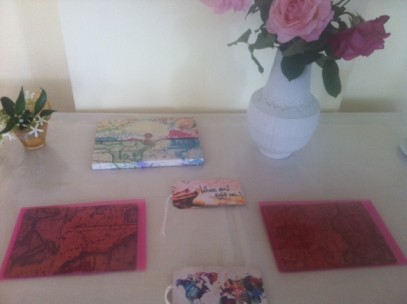

We finished up with a one-hour writing practice session and then closed the morning with one member of the group sharing their writing and receiving feedback.
Tonight before going to sleep and sorry to rub it in after another delicious meal of spinach parcels, gorgeous, ruby purple beetroot, tarasamalta, a green salad with a dressing to die for, a Cajun style Greek bread and lemon, and rosemary baked, crispy potato chips, I ended the evening sitting on the balcony of my room, meditating under the gaze of a full moon. I lit and burnt charcoal with Frankincense and totally drunk in the full moon sky.
By the time I’d finished I’d so much energy I couldn’t sleep so decided to write this blog post instead.
I love it here. I love teaching on this retreat. I love working and supporting writers in this wholehearted and wholesome way. It’s a joy and creatively enriching pulling together all the exercises and writing activities that act as inspiration and creative stimulus for the writing to emerge. I can’t think of a better way to spend my day doing work I love.
Tomorrow is my favourite part of the retreat when we enter into twenty hours of silence offering writers a much-needed space to deepen into writing without the distractions of verbal human contact. The staff at Kalikalos join in as well and we create a blanket of silence across the retreat centre for twenty-four hours. See you back here tomorrow.
No Comments
Sunday, May 31st, 2015
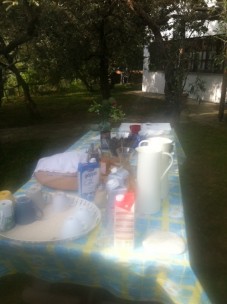
For the next six days I’m going to be posting a blog every day whilst away running the Inside Out Writer’s Retreat in Greece.
It’s all part of a writing challenge each of the writers on the retreat will be going through. Each writer will determine and set a personal writing challenge for the retreat. Each has challenged themselves to stretch beyond a writing goal they feel comfortable in achieving.
A few years ago someone reminded me of this excellent quote, ‘Progress, not perfection.’ This has been a liberating quote for me when I realized that part of becoming a working writer is about focusing on the progress made each day through writing practice. I can’t stress how much your development as a writer is based on developing the habit of a writing practice. There’s little point wanting to write a book if you don’t get into a regular habit of writing to begin with.
Writers who write their first book, without little in the way of writing practice behind them, who then have success with the book are far and few between. For the majority this is not the case and we have to do the work. We have to put in the time. We have to write even when we don’t feel like it. We have to deal with rejection and failure. We have to make time to write when it doesn’t feel like there’s time to write. We have to be wiling to get down the shitty first draft and not just stop there, but also get writing beyond that.
When all is said and done you can’t really become a writer you respect unless you give yourself the space and time to write and do it regularly. Over the course of the next five days I plan to take each of the writer’s on a journey that will connect each one to the core thread of what it is they want to write about, to dive into beginning or extending some of that writing and to discover ways in which they can keep writing when they’re back home.
We’ve had an almost hundred percent re-booking for this retreat so we know that what happens here in Greece in making a difference in some important and valuable ways in writer’s lives. In the course of the next five days I’ll be sharing insights into some of the exercises and activities we get up to over the course of the week.
The sun is back out after a few days of rain and a drop in temperature but it’s nowhere as hot as when we were here last July. Now that probably is a good thing. With less of a pull to the beach and the sea the writers can get down to business.
No Comments
Tuesday, May 19th, 2015
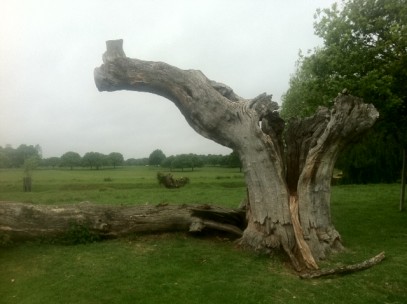
Last weekend ended with a social engagement on the Sunday evening, which even though I enjoyed catching up with old friends sapped my energy leaving me desperate for some me time.
By the time I hit the sack I knew I needed to recharge my batteries. My job the next morning began at 9.30am so before falling asleep I planned to get up extra early the next day so I could head over to one of my favourite green spaces in London, Richmond Park. The weather the next morning was nothing to write home about but I didn’t let that put me off and by the time I pulled up in the car park it was raining with a crisp breeze that pelted cold air on your face.
Still determined I pulled on my wellingtons, wrapped up and strode off for my morning walk. With no heavy bag on my shoulder and just my iPhone in my coat pocket I suddenly felt remarkably free.
I headed off in the opposite direction of the school run traffic streaming through the park which I needed to get as afar away as was possible, which is the park’s one only un-redeemable feature. The wind howled and the sharp crisp air pelting across my face suddenly felt comforting, my own call of the wild.
In the distance I spotted a tree off the beaten track housing what looked like a hollowed out bark and headed over to investigate. It was a wonderful specimen, maybe a hundred or more years old. My iPhone sparkled as I took images of inside the trunk. Some of those images resembled hill top terrains. Take a look at the image below to see what I mean.
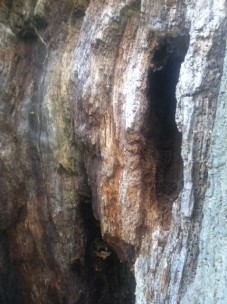
Nature therapy is available and free. My morning dose of nature therapy had immediate effect in re-energising my diminishing energy reserves.
For the next 45 minutes I sauntered across the green plains of the park stopping to commune and take photo’s of various trees. By the time I realised just how much I was enjoying myself I had only thirty minutes left to get back to my appointment but Oh, I felt delicious.
Back in my car a quick glance in the car mirror reflected back a face with blushed cheeks that had clearly benefitted from a free, natural non-surgical procedure. I’d been injected with a huge dose of energy.
The next day was yet another early start but at least one where I could get a seat on London’s heaving packed rush hour traffic. Before leaving home I’d popped two decorated luggage tags into my journal. Then on the train I pulled one out and on one side I wrote across the top, three things I intend to get done for the day. This really helped me prioritise for the day in a way that felt light and easy.
On the other side of the luggage tag I wrote across the top, three good things about yesterday. I then proceeded to answer both questions writing my answers directly onto the tags.
Things started off well with question one but by question two I began frantically scanning the day trying to recall the best bits of the day. I mean anything and to my surprise found myself struggling. By item three I’d drawn a blank. Yes in less than twenty-four hours I had forgotten about my wonderful time in Richmond Park.
That’s why writing things down makes a difference. Writing it down brought the experience back into focus and made me in the moment instantly happier. Remembering my time and most importantly recording it felt like I had retrieved something of value from my past.
Most people are familiar with the practice of writing a Gratitude journal and more recently the Five Minute Journal click here for more information http://www.fiveminutejournal.com/ has condensed this practice in their product the 5 Minute Journal.
Years earlier I’d introduced a similar practice, 7-minutes of spiritual grace writing practice to groups I worked with. The idea behind it was once you set yourself an achievable goal of writing for 7-minutes you’ll probably without even realising it write for even longer.
The reason I’m sharing all this with you is because I know how busy you are. Most people just can’t imagine where they’ll find the time to get through even a quarter of their to do list let alone write a journal.
But wait a minute? How many of your priorities get compromised at expense of the things we love or are important to us as we fritter away valuable hours checking social media and playing on our mobile phones. Both the five and seven minute practices are practical and fast ways to gain the many benefits of journaling and being reflective.
For example a 2012 study found that women who wrote down three positive events and the reasons why they were positive experienced a reduction in physical complaints such as headaches, back pain and muscle tension.
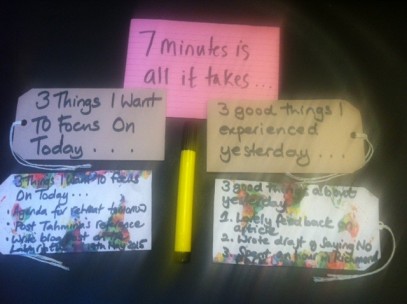
For the next seven days how about trying out the fast track, seven-minute journal writing practice to discover how it works.
Here’s how it works:
Writing materials needed:
- Collect seven luggage tags or seven small slips of paper or use your journal or notebook. It’s a good idea to try writing on a luggage tag because it breaks the cycle of writing for work and feels a lot lighter and fun.
- Date each luggage tag on one side for future reference.
- Each day for the next seven days on one side of your luggage tag write three good things that happened the previous day.
- Next on the other side write down three things you’d like to get done today. It’s common for individuals to find that they end completing a different activity than the one originally entered on their list. But they also find that what gets done is better than the original intentions.
- The second thing that turned out to be a bonus is that without making an effort people find themselves continuing to write after the seven minutes is up. It’s a great way of bypassing writers block and a lack of confidence.
- This practice of short writing bursts is a smart way of outwitting the inner critic who often considers short writing periods insignificant which means the inner critic is likely to be off duty and less likely to show up.
Remember the journey of a thousand miles begins with the first step. Let’s build a journaling revolution one line at a time as a base line for becoming a writer and growing your business!
If you’re ready to try this out or interested in learning lots more about how to become a writer then there’s still time to join me and a small group of writers at the Inside Out Writer’s Retreat I’ll leading in Greece in ten days time. Click here for more details: http://www.alexandros-kalikalos.com/creative-writing-greece
No Comments
Friday, April 10th, 2015
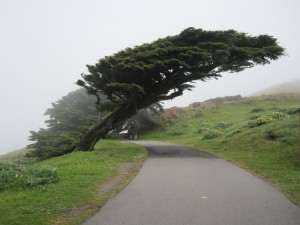
Recently I was invited to offer my resignation from a board I had served on a voluntary basis for several years. I had been planning my exit for months but was still hanging in there despite several of my close and trusted colleagues advising me it was time to leave.
A newly appointed chair (voted in during my absence at one of the board meetings) had taken over the reins and had decided along with other board members that the services of myself and two other members of the board were no longer required.
They had a point, to an extent but from my perspective the way the letting go was done was shabby. For years I have been bringing up the shadow themes about our board, pointing out the toxic dynamics in our relationships and overall management of the paid staff team. My ideas and suggestions had repeatedly fallen on deaf ears. And in one way it seemed unfair that someone new was given air space, showered with respect in a way that contradicted my experience of increasingly feeling I often felt overlooked and ignored. There were other factors I could mention but that would really be taking me off the point.
What was most important was the recognition on my part that there was something different about me at that last board meeting. I sat in my chair with an open heart knowing a storm was brewing up around me. I had arrived with an inner knowing that had been revealed to me in my journal entries several months before. The message that came through my words scattered throughout the various journal entries was repetitive and clear.
I was no longer enjoying my time on the board. I loved other parts of my work and time with the organisation but membership on the board felt draining and depleting. Every morning before the board meeting a slow sense of dread would fill me and my body signals could not have been clearer about signaling its dis-content as I pushed myself to sit and be with individuals I had little in common with and for whom I felt little or no connection to.
On many levels even though I knew the truth (and my journal entries evidenced this), and the body signals were loud and clear, I didn’t fully listen to my own inner wisdom. Part of me is forever hopeful, which sometimes works out and other times it doesn’t. But even so as I sat and listened to the request I realized that in that moment, I was ready, that it was the right thing to do and that by leaving I was creating the space for something new and better.
The thing is, bad things happen to good people every second of our waking lives. The people and innocent children on the recent French plane allegedly bought down by its co-pilot were I imagine all ‘good people’. The reality is as much as we would like to we really fully protect ourselves from injustice or unfair treatment we cannot fully insulate ourselves or our lives from bad things happening to us. But what we do have to hand is a choice about how we choose to respond.
Recently, the school someone close to me taught at for many years and where she was in a senior leadership position (and was a brilliant assistant head) was taken over by a young, ambitious super head. Suddenly her career and the careers of several other individuals in the school who spoke out against many of his decisions and actions were jeopardized and with the click of a finger these stunning teachers were either forced to leave the school or left of their own accord because they could not stand for what was going on any more.
The episode prompted many of the group to re-evaluate their lives and careers. Relationships have been deepened with loved ones. Many of the group discovered whom they could turn to during the difficult times that followed. They learnt amongst many things that there was life beyond the career and the school they were forced to leave or quit. Each one of them in their own resilient way bounced back.
It struck me that when these tough times call, and call they will what is most valuable is not that we try and shield ourselves from what is happening. Our most valuable weapon to pull us through is in fact resilience.
Resilience is the ability to adapt and respond well in the face of stress and adversity. I’ve learnt both from personal experience and from many of the individuals and groups I work with that a potent surge in creativity and inspiration is often close behind periods of loss, trauma and adversity in our lives.
If you would like time out to think about your life right now and where your resilience may be called for, or perhaps you have just lived through a life or career challenge, then have a listen to an interview with with one of the world leading experts on resilience, Mark Matousek. Click here to listen
In the interview Mark discusses his take on resilience and adversity. Discover what he’s learned about resilience from the many people he’s interviewed on his website and in his book, When You’re Falling Dive. Listen out for tips on what gets you back on your feet after you’ve been knocked down and how trauma, crisis and loss are spiritual opportunities for us to evolve into richer human beings.
If you want to take this work further or perhaps you work as a practitioner and would value more learning and training in this area then Mark will be in the UK at the end of May teaching a three-day intensive, When You’re Falling Dive course at the wonderful Schumacher College in Devon, May 26th-May 29th
Click here for more details of the course
I’ve worked with Mark before and know that his work is deeply transformative and offers both a psychological and spiritual approach to building and nurturing resilience in our lives using therapeutic writing.
No Comments

